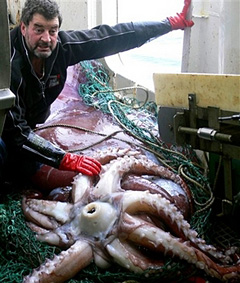 |
 |
 |
 News from Around the Americas | February 2007 News from Around the Americas | February 2007  
New Zealand Fishermen Catch Rare Squid
 Ray Lilley - Associated Press Ray Lilley - Associated Press


| | In this photo released by New Zealand Fisheries Department on Thursday, Feb. 22, 2007, shows an unidentified New Zealand fisherman with a giant squid believed to have been caught in early February 2007 in the Ross Sea, Antarctica. (AP/New Zealand Ministry of Fisheries) |
A fishing crew has caught a colossal squid that could weigh a half-ton and prove to be the biggest specimen ever landed, a fisheries official said Thursday.

The squid, weighing an estimated 990 lbs and about 39 feet long, took two hours to land in Antarctic waters, New Zealand Fisheries Minister Jim Anderton said.

The fishermen were catching Patagonian toothfish, sold under the name Chilean sea bass, south of New Zealand "and the squid was eating a hooked toothfish when it was hauled from the deep," Anderton said.

The fishing crew and a fisheries official on board their ship estimated the length and weight of the squid: Detailed, official measurements have not been made. The date when the colossus was caught also was not disclosed.

Colossal squid, known by the scientific name Mesonychoteuthis hamiltoni, are estimated to grow up to 46 feet long and have long been one of the most mysterious creatures of the deep ocean.

If original estimates are correct, the squid would be 330 pounds heavier than the next biggest specimen ever found.

"I can assure you that this is going to draw phenomenal interest. It is truly amazing," said Dr. Steve O'Shea, a squid expert at the Auckland University of Technology. If calamari rings were made from the squid they would be the size of tractor tires, he added.

Colossal squid can descend to 6,500 feet and are extremely active, aggressive hunters, he said.

The frozen squid will be transported to New Zealand's national museum, Te Papa, in the capital, Wellington, to be preserved for scientific study.

Marine scientists "will be very interested in this amazing creature as it adds immeasurably to our understanding of the marine environment," Anderton said.

Colossal squid are found in Antarctic waters and are not related to giant squid found round the coast of New Zealand. Giant squid grow up to 39 feet long, but are not as heavy as colossal squid. | 
 | |
 |



